POLICE Scotland chiefs approved all but one application for surveillance operations last year, the force has admitted.
All applications for surveillance have to be approved by an officer with a minimum rank of Superintendent under rules to prevent abuse.
But Police Scotland have admitted that of the surveillance requests submitted by officers in the 2013/14, 347 were approved and only one rejected.
The force has been accused of appearing to “rubber stamp” requests rather than subjecting them to proper scrutiny.

The concern was raised by Solicitor advocate John Scott QC who is heading up the new independent advisory group examining the use of stop and search powers in Scotland.
Under the Regulation of Investigatory Powers Scotland Act (RIPSA) public bodies can gain access to the email and phone records of anybody in the country.
Introduced in 2000 it was intended to combat serious crime and terrorism – and can only be used where it is considered necessary and proportionate.
As a safeguard to stop unjustified snooping the surveillance has to be approved internally by an authorising officer.
In response to a Freedom of Information request Police Scotland revealed: “In the reporting period 2013/14, (since 1st April 2013) Police Scotland had made 347 approved applications and one rejected application for surveillance under RIP(S)A.”
It said investigations are discussed with an authoring officer at a “very early stage” and that “some” applications are dropped prior to official application.
The force refused to reveal details for a period less than a year in fear it would “reveal specific operational activity”.
It also did not reveal details of the applications.
John Scott said it was possible that all applications met the “necessary test and should therefore be granted”.
“On the other hand, it seems remarkable that only one application out of 348 was turned down.
“This is a statistic which causes some concern about the robustness of the scrutiny applied to applications in this important area.
“Different senior officers are involved in these decisions and it may be that some reassurance is required as to initial and ongoing training on dealing with such requests.
“On the face of it this reply may suggest that, in many or most cases, the decisions serve as mere rubber-stamps to the applications.”
At the start of this year Christine Grahame MSP, the head of the Scottish Parliament’s justice committee warned police powers could turn into a “snoopers’ charter”.
She claimed the police force is monitoring a total of almost 20,000 calls and emails every year working out as an average of 53 every day.
Council authorities also use the act to get carry out clandestine probes.
In January it was revealed South Ayrshire Council authorised stings regarding underage sunbed sessions, the unlicensed sale of fireworks and dog fouling under the act.
A Police Scotland spokesman said: “The ability to acquire communications data is governed by law and strict codes of practice with built in safeguards, which take full account of the importance of necessity, proportionality and collateral intrusion.
“Police Scotland operates responsibly and lawfully within this framework.”